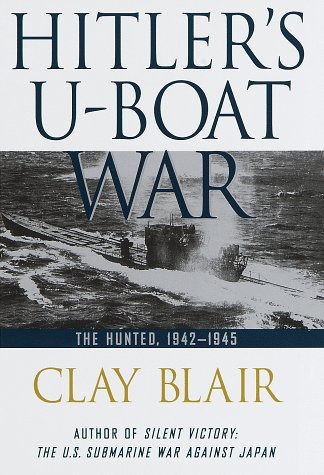

Full description not available
C**C
The definite study of the atlantic war
I purchased both of Clay's books a while back and finally decided to review this one, all i can say is WOW, there are very few books out there that i can read over and over and these are some of them, the level of detail the author dug up is simply amazing,it completely baffles me how some reviewers dont like the book because it "has too much detail"?? my God,thats the best part of it!!! i guess thats what sets apart "casual" WW2 readers vs die hard historians like myself ,so be warned, if you are looking for a 200 page book that tells you "Yeah the U boat threat was never really that and the allies won the war" with a bunch of color pictures and a DVD included with the latest Hollywood CGI please go elsewhere, these are highly detailed and technical books packed with info for the hardcore! if i have a very small criticism of the book is that Blair is a little biased towards the Germans but this is because he served during WW2 on a allied Sub so thats expected, no biggie,he more than makes up for it,outstanding books!!
A**R
Just what I was looking for!
Just the book I was looking for, in great shape.
J**K
Great history part two
Gives you an insight of what went on between the Germans and the Allies as they mutually tried to out wit and out develop each other for the ultimate weapon or counter measures to out do their foe.
B**S
The second volume of Blair's exhaustive study of the Battle ...
The second volume of Blair's exhaustive study of the Battle of the Atlantic suffers from the same problems as the first volume (Hitler's U-boat War: The Hunters: 1939-1942): overwhelming detail, inconsistent statistics, and woefully inadequate indices. Nevertheless, he is right in arguing that the U-boats never came close to cutting Britain's lifeline across the Atlantic despite the widespread belief that the U-boats came within a hair of doing so. The British historian Andrew Roberts agrees: however vicious and bitter the Battle of the Atlantic was, “Britain’s survival was never really in doubt, even though for most people on both sides it certainly did not look that way at the time." Andrew Roberts, The Storm of War: A New History of the Second World War (London: Allen Lane, 2009), p. 374.
R**D
Too slow.
As good as the Submarine war against Japan. Very insightful as to British attitudes toward their allies. As the past has so often proved the Brits didn't know their ass from their elbow. The learning curve was actually slower for them than the U.S. and Canada.
D**N
Massive But Endlessly Repetitive and Bland
Without doubt, this two volume book is both a massive and amazingly detailed research effort that categorizes, possibly, EVERY single action and fate of every U-boat that ever went to sea in World War 2. That is also, however, it's major failing. It reads far more like a 1200 page INDEX with about 211 pages of explanatory, actual narration sprinkled in amongst the endlessly repetitive commentary. In the early days of media communication, radio sportscasters in America would receive the bare bones results of major league baseball goings on by inning and would add their own color commentary to spice up the basic information. Color commentator/broadcasters would turn "Jones singled to left" into "Arnie Jones ripped a three and two count fastball into left where Hellion Peters gobbled it up and fired to second, holding Arnie to a long single." Very spicy. This is, by degree and without adding much presumptive filler, what Blair did in his commentary. He read every report, converted into what he considered narrative, and then retold the operational report to us. Unfortunately, it becomes more than a tad annoying by the 500th repetition. He makes critically important and valid points throughout the two volume set, most importantly that, despite the panicky rhetoric, the Allies were NEVER in a position of ANY danger as a result of the U-boat attacks, even at their worst and that the U-boat war was a losing proposition for the Germans from the start. He really didn't have to take 1411 pages to make this point and rarely does he devolve into an overall commentary, which is really what the subject demands. He sells his ideas by hitting you over the head with a narrative version of every Allied/Axis after action report in the files. Eventually I found myself wishing either the Germans would win or that they'd simply pack up their pathetic U-boats and go home, so annoying did I find the style of writing and presentation. If you have NOTHING to do and want to read 1411 pages of what you could have learned by reading the fly leaf, go have at it. If you have ANYTHING better to read, then gobble up the dust jacket's information and pick up War and Peace, a lively read by comparison. Sorry to the late Mr. Blair but if this is how he did all his books, then he would have been better suited to writing gigantic indices and letting someone else, perhaps Dan van der Vat, write the book. Incidentally, van der Vat's "The Atlantic Campaign" is a far more captivating read.
S**R
Five stars
Quick service. The goods were exactly as advertised.
D**R
A GREAT BOOK ON THE UBOAT WAR
This is to me the most thorough book on the U Boat war
Trustpilot
1 month ago
1 month ago